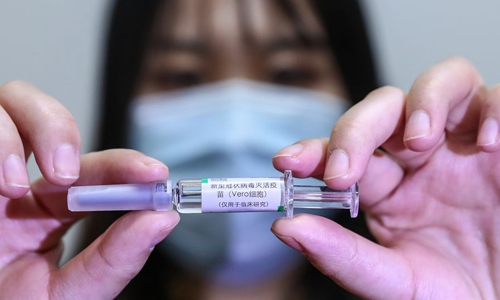Beijing infection rate 'too low' for Phase III COVID-19 trials
By Guo Yuandan Source:Global Times Published: 2020/6/21 20:03:40

A staff member displays a sample of the COVID-19 inactivated vaccine at a vaccine production plant of China National Pharmaceutical Group (Sinopharm) in Beijing, capital of China, April 10, 2020. Photo:Xinhua
The current coronavirus outbreak in Beijing is not large enough to support a Phase III clinical trial, which can only be conducted if an outbreak becomes a pandemic, experts said.
Wang Junzhi, an academician of the Chinese Academy of Engineering and deputy head of the vaccine research and development group under the State Council, told China Central Television on Saturday that completing Phase III clinical trials is crucial for the success of China's vaccine research and development.
Five COVID-19 vaccines are undergoing clinical trials in China, and three have completed Phase II trials, the Ministry of Science and Technology and the National Health Commission announced on Friday.
All research, development, evaluation standards and technical guidelines are in line with international standards, Wang said, and the next step involves Phase III clinical trials to gauge the effective protection rate of a real vaccine in a large population.
Phase I trials focus on the observation of safety index; Phase II on the observation of immunogenicity and safety indicators; Phase III on the observation of whether the vaccine can prevent infections and the protection rate in the epidemic population and areas, Wang said.
The rate of protection is calculated by comparing the number of people who took the vaccine but became infected after the epidemic cycle with those got a placebo and became infected.
"We need Phase III clinical trials, where the vaccine is tested for effectiveness over an epidemic period," Wang said.
The Beijing Municipal Health Commission said 22 new local confirmed cases were reported on Saturday, taking the total to 227 since June 11. There are two high-risk areas and 34 medium-risk areas in Beijing. The cluster of cases in Beijing has spread to Northeast China's Liaoning, North China's Hebei, Southwest China's Sichuan, East China's Zhejiang and Central China's Henan provinces.
Netizens have asked if Beijing has the conditions to complete Phase III clinical trials in this outbreak.
The answer is no, Tao Lina, a Shanghai-based vaccine expert, told the Global Times over the weekend.
"Beijing is currently under strict control and the infection rate is too low. The confirmed cases that have been announced are all related to the outbreak in Xinfadi Market. These cases were already in the incubation stage and are now becoming apparent. There are not enough real new infections to justify a Phase III clinical trial," Tao said.
In a Phase III study, volunteers who get the vaccine should have the same infection rates as those who get a placebo. But researchers require a sufficient sample size within a sufficient observation period.
"For all stages of a vaccine clinical trial, one prerequisite is that volunteers are all healthy. They are randomly assigned to each group, where it's ensured that they have the same chance of getting infected," Tao noted.
Wang Peiyu, a deputy head of Peking University's School of Public Health, told the Global Times on Sunday that Beijing is not qualified for Phase III clinical trials. Like Jilin, Beijing only has scattered infections.
According to media reports, in May the research team led by epidemiologist Chen Wei and China's CanSino Biologics entered into a co-development agreement with Vancouver, British Columbia-based Precision NanoSystems for an mRNA lipid nanoparticle vaccine against COVID-19. In June, China's Sinovac plotted a pivotal COVID-19 vaccine trial in Brazil after a positive phase 2 trial.
On June 11, the Philippine Department of Science and Technology said that the Philippines is in negotiations to join a Beijing-based biotechnology company on the novel coronavirus vaccine human trial, and that it is likely to join the Phase III trial.
That's good news, said Tao. In China, Phase III trials should be done in places with many incidents. The experiment location will take the outbreak situation, as well as the partnership between China and the country, into consideration.
Brazil is at the epicenter of the epidemic, which is beneficial for research on the actual protection effect of vaccines, which is the key to China-Brazil cooperation.
"Cooperation in human clinical research on vaccines is of low technical content, but tests both sides' organizational and cooperative ability."
As of 6 pm local time on Sunday, there were 1,067,579 confirmed cases of COVID-19 in Brazil, according to Brazil's Ministry of Health.
As to whether China's vaccine research and development is facing the challenge of coronavirus variations, Tao said that the nation "can use the existing vaccine. If the virus mutates and the existing vaccine is not good enough, we can analyze the key components of the mutated virus in the current vaccine. It is a common solution."
Zhang Wenhong, a prominent infectious disease expert and leader of Shanghai's COVID-19 medical team, has told the media that "a second wave of the epidemic in autumn and winter is certain."
An anonymous expert agreed that it will be hard to avoid a second wave this year. If necessary, human coronavirus infection tests can be conducted under closed and safe conditions and on the premise that the safety of subjects is ensured.
Sweden, Germany and other countries have conducted human infection tests. This means exposing healthy volunteers to the virus and checking if those who have been vaccinated are protected from infection.
It's a risky process and must be carried out carefully, the expert stressed.
Posted in: SOCIETY,FEATURE